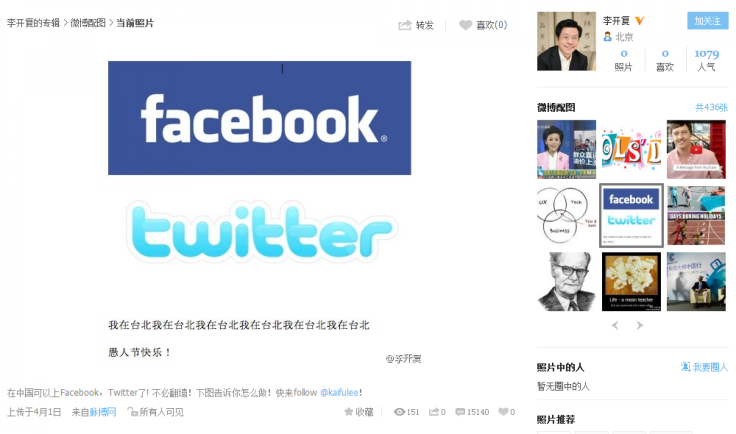China Allows Citizens to Access Facebook And Twitter -- April Fools'!

An April Fools' Day prank by one of China’s most respected online personalities, former Google (NASDAQ: GOOG) China chief, Lee Kai-fu, has cut deep for some Internet users.
Lee announced on his Weibo profile that both Facebook and Twitter were no longer blocked by China’s infamous censors who are known colloquially as "China’s Great Firewall."
“You can now get on Facebook and Twitter in China! No need to jump over the wall! The image below will tell you how!” he wrote to his millions of followers.
Along with the post, Lee attached directions (showing the Facebook and Twitter logos) with a line of text in Chinese informing readers that they had been duped.
“I’m in Taipei, I’m in Taipei, I’m in Taipei. Happy April Fools' Day!” the small line of text read.
Taipei, the capital of Taiwan, still has access to several websites that have been blocked on the mainland, like Facebook and Twitter.
Those who were eager to share the fake good news with other gullible followers resulted in it being reposted 30,000 times by late afternoon on April Fools' Day, and garnered more than 10,000 comments from those who fell for the prank.
“You shouldn’t be so unkind,” one Weibo user said in a response, as translated by the Wall Street Journal.
China has blocked Facebook since July 2009 after riots in northwestern province Xinjiang erupted over calls for independence. Many of the activists used Facebook (NASDAQ: FB) to communicate to and mobilize other protestors, in what some media called the "new Tiananmen Square," prompting the Beijing government to block access to the social media site on mainland China.
Other user-generated sites including Twitter and YouTube were blocked around the same time.
While some residents in China are able to "jump" over the Great Firewall by buying Virtual Private Networks for their computers, for the most part, only foreigners and corporations are willing to pay for the software. Also, China’s censors have clamped down on anticensorship security, making it even more difficult for VPNs to access blocked websites. The Chinese government also added both the English and Chinese language versions of the New York Times to their list of blocked websites.
Thus, many Chinese netizens, weary of a clampdown on censorship, hoped that Lee's message heralded more internet freedom ... until they realized the truth.
“Should have known. That would be too good to be true,” one fooled user wrote in response.
“Hate you!” another user said.
Though Facebook and Twitter didn't have enough time to gain enough of a following from mainland Chinese before it was blocked, many have expressed curiosity about the websites that are credited with inspiring the creation of China’s very own social media site, Weibo.
Unfortunately, China’s social media enthusiasts still wait in vain, as none of those websites have become accessible in mainland China.
© Copyright IBTimes 2024. All rights reserved.






















